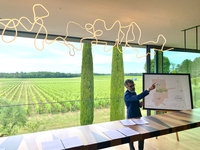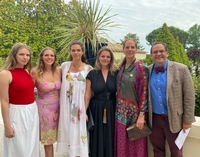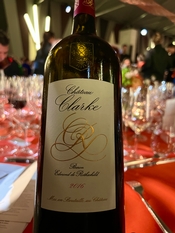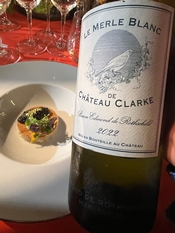Back in 1973, Baron Edmond de Rothschild, embodying the third branch of the Rothschild family in Bordeaux (in addition to the Rothschilds at Mouton and Lafite in Pauillac), set his sights on Château Clarke – then an almost abandoned vineyard situated on clay–limestone hilltops. He saw the potential of the site, however, given a rich history dating back to at least the 12th century and shaped in the 18th century by Anthony Clarke, who gave it its name.
A commitment to rebuild the estate paid dividends, as the wine has proven to be a top performer in an appellation whose wines too often seem rustic or boring, especially compared to more illustrious appellations like Saint Julien or Margaux. For over the past 20 years since I have been formally tasting Bordeaux, Château  Clarke regularly outshines its Listrac counterparts.
Clarke regularly outshines its Listrac counterparts.
Looking ahead, the wine is set to get even better. The gathering on June 7 of this year marked not only the golden anniversary of Baron Edmond de Rothschild’s acquisition, but also a more recent €18 million ($19.5 million) investment to renovate the estate for the 2020s and beyond.
Participants benefitted from a tour of the recent structural improvements carried out over the last three years (with interruptions due to COVID). They include an impressive new winery, inaugurated for the 2022 harvest, which boasts 45 stainless steel tanks varying in size from 50 to 160 hectoliters to better match more exacting parcel-by-parcel harvesting. A new tasting room combines classicism and elegance with a panoramic view of the 55-hectare vineyard. To address climate change, two independent entities, Bordeaux Sup Agro and Sovivins, are auditing the vineyard to select the most suitable grape varieties and rootstocks, as part of the restructuring.
Readers should know that Château Clarke has one of the coldest terroirs in the Médoc, which is becoming a clear advantage for climate change.
The cellar renovation also includes new space for the estate’s excellent dry white, the Merle Blanc, crafted from some 4.5 hectares of vines. The Merle Blanc is an important part of the estate’s heritage, as it was originally introduced way back in 1890.
Hundreds of participants from all over the world were greeted by Baron Edmond de Rothschild’s daughter-in-law Ariane de Rothschild, who presides over the family  holding company, and hosted the party with daughters Noémie, Alice, Eve, and Olivia. It was a treat to see the magnificent four-hectare gardens surrounding the estate, featuring a diverse selection of plants and trees (and sculptures), which are looked after with the same care and attention as the vines and wine. The evening featured piano prodigy Valentin Filatre, who played a mix of classical, pop and rap music. Balletic leaps on roller skates by dancers Xuan Le and partner Shihya Peng entertained participants, although I especially enjoyed a trio of singers during the pre-dinner outdoor gathering.
holding company, and hosted the party with daughters Noémie, Alice, Eve, and Olivia. It was a treat to see the magnificent four-hectare gardens surrounding the estate, featuring a diverse selection of plants and trees (and sculptures), which are looked after with the same care and attention as the vines and wine. The evening featured piano prodigy Valentin Filatre, who played a mix of classical, pop and rap music. Balletic leaps on roller skates by dancers Xuan Le and partner Shihya Peng entertained participants, although I especially enjoyed a trio of singers during the pre-dinner outdoor gathering.
The dinner featured excellent wines, but I have a soft spot for the reds ever since Eric  Boissenot was hired as wine consultant, as they have gained in refinement and freshness. Indeed, the 2016 vintage – his first with the estate – exudes radiance, refinement, and ripe fruit. It proved a marvelous pairing for the veal filet and morel mushrooms. And readers should buy as much of the Merle Blanc as possible: a hidden gem for its excellent price/quality ratio. Even in a challenging vintage for dry white wine like the dry and hot 2022, the Merle Blanc came across fresh and refined, proving a fine match for the bay prawns and Aquitaine caviar that opened the dinner.
Boissenot was hired as wine consultant, as they have gained in refinement and freshness. Indeed, the 2016 vintage – his first with the estate – exudes radiance, refinement, and ripe fruit. It proved a marvelous pairing for the veal filet and morel mushrooms. And readers should buy as much of the Merle Blanc as possible: a hidden gem for its excellent price/quality ratio. Even in a challenging vintage for dry white wine like the dry and hot 2022, the Merle Blanc came across fresh and refined, proving a fine match for the bay prawns and Aquitaine caviar that opened the dinner.
About the Edmond de Rothschild Héritage:
In total, the 55 hectares of vines of Château Clarke are integrated into a set of 200 hectares, including wooded areas and eco-pastures. The family group also has two other Médoc estates: Château Malmaison in the neighboring Moulis appellation and Château Odilon, of the Haut-Médoc appellation. Beyond the Médoc, the group owns  two properties on Bordeaux’s Right Bank: Château des Laurets in Puisseguin-Saint-Émilion and Château de Malengin (Eve), in Montagne-Saint-Émilion.
two properties on Bordeaux’s Right Bank: Château des Laurets in Puisseguin-Saint-Émilion and Château de Malengin (Eve), in Montagne-Saint-Émilion.
Outside of France, they own two properties in New Zealand: Rimapere Sauvignon Blanc and Pinot Noir in Marlborough, and Akarua Pinot Noir in Central Otago, and have three international partnerships, in South Africa (Rupert & Rothschild), Argentina (Flechas de Los Andes, in partnership with Laurent Dassault) and Rioja (Macán, with Pablo Alvarez, owner of Vega Sicilia).
All of these vineyards and enterprises have been placed since 2015 under the “Edmond de Rothschild Héritage” banner, which brings together the group’s non-banking activities, in particular hospitality, farms (cereals, livestock, dairy) and a nursery.
